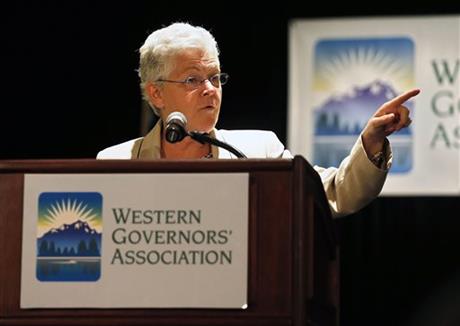
By IVAN MORENO
EPA Administrator Gina McCarthy delivers a keynote speech during the annual Western Governors’ Association Meeting, at the Broadmoor Hotel in Colorado Springs, Tuesday, June 10, 2014. The head of the Environmental Protection Agency promoted currently proposed clean power plant rules to Western governors Tuesday, framing the plan as a way to deal with destructive wildfires and floods that have ravaged the region in recent years. (AP Photo/Brennan Linsley)
John Hickenlooper, Gary Herbert, Steve Bullock
Colo. Gov. John Hickenlooper, center, talks with fellow Governors Gary Herbert of Utah, left, and Montana’s Steve Bullock, during the annual Western Governors’ Association Meeting, at the Broadmoor Hotel in Colorado Springs, Tuesday, June 10, 2014. Ten governors from western states attended the second day of the conference Tuesday, discussing common regional issues. (AP Photo/Brennan Linsley)
Jan Brewer, Sam Brownback, Butch Otter
Governor of Arizona Jan Brewer, left, talks with fellow Governors Sam Brownback of Kansas, right, and Idaho’s Butch Otter, during the annual Western Governors’ Association Meeting, at the Broadmoor Hotel in Colorado Springs, Tuesday, June 10, 2014. Ten governors from western states attended the second day of the conference Tuesday, discussing common regional issues. (AP Photo/Brennan Linsley)
Prev
1 of 3
Next
COLORADO SPRINGS, Colo. (AP) — The head of the Environmental Protection Agency promoted proposed clean power plant rules to Western governors Tuesday, framing the plan as a way to deal with destructive wildfires and floods that have ravaged the region in recent years.
“There are some states that are really feeling some of the brunt of the changing climate most dramatically with wildfires and floods and droughts and all of those challenges,” EPA Administrator Gina McCarthy said Tuesday after a two-hour meeting with 10 governors in Colorado Springs where the annual Western Governors’ Association conference is happening.
The plan has been met with reluctance — and skepticism — from some governors.
McCarthy emphasized that states will have flexibility in developing plans to reduce carbon output. But she acknowledged that some governors whose states depend heavily on coal expressed concern about the new rules.
The EPA rules announced last week set a goal of cutting emissions of the greenhouse gas by 30 percent nationwide from 2005 levels. The goal’s deadline is 2030.
She said the biggest concern from governors is that the EPA doesn’t “treat every state as if they’re the same.”
“Even out West, they’re different. Some are very much coal-dependent, while others are very much advancing renewables in a strong way,” she said.
Some governors have blamed increasingly destructive fires on climate change, including Colorado Gov. John Hickenlooper.
Wildfires in Colorado have destroyed hundreds of homes the past two years, and in the fall, flooding caused record damage in several parts of the state.
Still, other governors in the region, like Wyoming Gov. Matt Mead, have decried what they call the administration’s job-killing war on coal.
“I don’t think the question really is how is it going to affect Wyoming. I think the question is how it’s going to affect the country,” Mead said, noting how his state produces large amounts of coal that the rest of the nation uses.
McCarthy said the new regulations aren’t “the end-all be-all,” but that she hopes it changes companies’ strategies on energy development.
“It’s not going to get us where we need to go in terms of addressing climate to the extent that science demands. But it is going to send investment signals,” she said.
In addition to Hickenlooper and Mead, the governors attending the annual WGA conference in Colorado are: Jan Brewer of Arizona, C.L. “Butch” Otter of Idaho, Sam Brownback of Kansas, Jack Dalrymple of North Dakota, Dennis Daugaard of South Dakota, Gary Herbert of Utah, Brian Sandoval of Nevada, and Steve Bullock of Montana.
The conference concludes Wednesday.



